INTERVIEW CONTINUED FROM PREVIOUS PAGE
Would you consider yourself a bartender or mixologist?
It’s so funny because I never really would have thought of the term mixologist before moving to L.A. It’s very much a term here. In that mindset, I am a mixologist…What I like about bartending is when you take ingredients – and you do this in cooking too – you can highlight one ingredient. Say mozzarella and tomatoes. It’s a simple salad, but you’re really just showing off these beautiful tomatoes. The other way to do would be to make something a little more complicated, where it’s not just about the tomato and the mozzarella, it’s a combination of flavor that makes something new. That’s what I like about a Manhattan or a Negroni, even a classic Gimlet. It really transforms the whole thing. I really like history, and when you look into why liquor was made and the esoteric ideas behind it, the transformation of one thing into another pure thing.
How did you become so interested in cocktails?
I started bartending when muddling was the cool thing – blackberries, raspberries, mint and lemongrass. The bar I worked at in Boston was very much like that.
What was the bar?
It was Cuchi Cuchi. They wanted to do a Prohibition style bar, not pre-Prohibition, but Prohibition, so that underground look with the flappers and that whole thing. When they told me to start doing classic cocktails, this is actually the book that I picked up – Vintage Spirits & Forgotten Cocktails. Ted Haigh goes through and finds these old drinks and shows these old books. Especially at that time, it was still really uncommon to see a lot of these drinks. A lot of these things, I didn’t know where they came from or how to get them. Back then Fee Brothers wasn’t anywhere. I called the company and said, “Will you sell me bitters?” It was cool.
Where did you go to art school?
I went to Mass College of Art in Boston, for illustration.
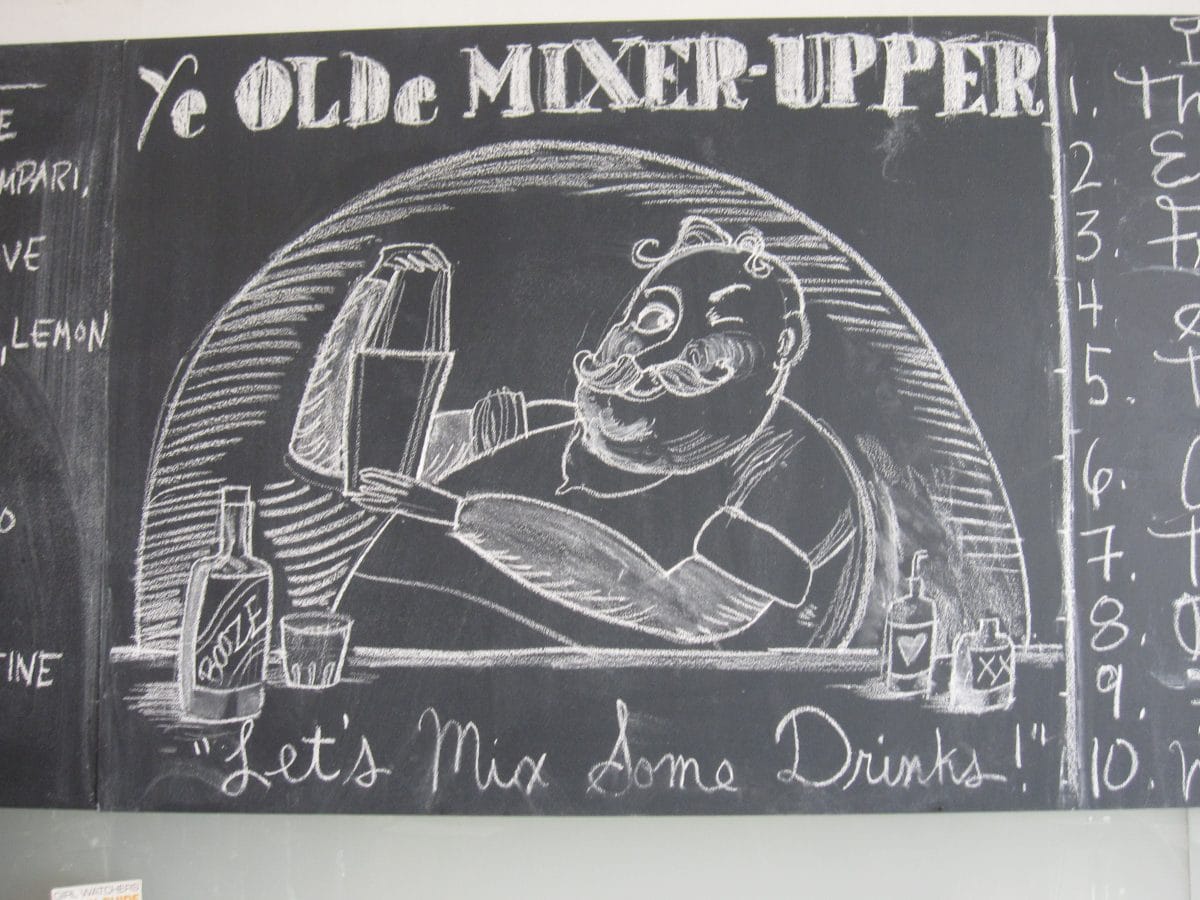
How do you think art helps you in what you do now?
There’s certainly an art form to bartending, from the combination of ingredients and understanding them, but also with people and understanding space and awareness. It’s funny. The last six months being here, I started watching videos of bartenders in Japan. I had never really thought about it in that way. It’s just one moment, one movement…Each drink is perfect. That’s something in art too. I always think of the phrase, Matisse, I think it was who said, and he painted, and later on in life, all he did was cut paper, and collages, essentially. Somebody asked him, “These are so simple, just cutting paper, how can you charge so much money? He said, “These took me 50 years to get to this.” So it’s that each thing is something to be aware of.
Why do you think more people don’t take a historical approach when creating cocktails?
Part of it’s just a process. I do this with myself and I look for this in other people, I try to see where they are in the evolution of drinking. I know when I first started drinking, I liked sweeter drinks. Very clean. I liked vodka. I didn’t really know why people drank gin. Whiskey seemed kind of cool because everybody tough was drinking it. When I first tried a Negroni I thought it was gross. Why would anybody drink Campari? I thought it was bitter, tastes weird and sits in your mouth too long. To answer your question, it just takes time.
Do you have a first cocktail memory?
The first time I had a great cocktail after reading this book and getting into this was at Pegu Club in New York. Just the way the guy made it was so meticulous.
Do you remember the cocktail?
It was The Last Word.
Would you say that you have any cocktail mentors?
Yeah, that’s the thing. I’ve been lucky to have some great teachers. The first guy who taught me was Clif Travers. He’s in New York now, and doing very well. Just his awareness of space and people.
Certainly Portland has some great bartenders. For liquor knowledge, Timothy Davey and Kevin Ludwig at Beaker & Flask. Of course Jeff [Morgenthaler]. All his stuff’s perfect.
What did you learn from him?
He might say I learned everything, which I would argue with, just because it’s Jeff. I would say precision, for sure. Before then I had more of an eyeball approach to things. It’s crazy to think I didn’t use jiggers before working with him. I don’t know if you’ve ever been to Zig Zag?
In Seattle?
Yeah.
No, not yet. I’ve heard good things.
It’s a cool place. I’ve never worked with Murray [Stenson], but everybody knows Murray. He’s a fun bartender to watch too, but he doesn’t actually measure.
Why does his drinks work out so well then?
I went there, and it was right after I started using [jiggers] at Clyde and said, “Murray, Jeff said to use jiggers. You’re not using any. What do you think?” He’s older, so he looked down, and was like, “Jiggers are for sissies,” then he walked away. Then he did come back and explained himself and said he’s had good drinks from people who have made drinks with jiggers, and he’s had bad drinks from people who make drinks from jiggers. I think there’s certainly something else to it.
What’s the something else?
It’s understanding of flavor. The way I usually talk about drinks with other people – we did this thing where we have a Drink Battle. This is an idea that Kevin Ludwig was doing in Portland with two Manhattans. It’s a great little way to show someone what a drink does and how as you drink it. Where you have a wheated Bourbon Manhattan and a rye Manhattan, use different vermouths. You have one that’s more bitter in the rye Manhattan, a lighter, sweeter Carpano for wheated Bourbon. Wheated Bourbon is so smooth. I always describe it as a graph. In art school, we used parabolas, so it’s a very simple line, but if you go with a rye Manhattan, it has this pop and it comes down in sweetness and then bitterness. It’s really a whole different drink.
What are some other bars that you really enjoy drinking at?
Definitely I always try to go to Zig Zag. In Seattle, I had some really good drinks. In Portland, Clyde’s always fun. Beaker & Flask, they do really good stuff. Teardrop [Lounge] is always an experience. I feel like it’s one of those things where they hear and they don’t know what’s going to happen. I always feel like that as a bartender. I don’t know what this is. They always have unusual ingredients.
In L.A., I really enjoy going to The Edison for the experience. Beautiful, beautiful bar. The Varnish has made some of the better drinks I’ve had in town. La Descarga, I like that place too. I’m coming from the Northwest, where appearance is second to the product. The look is better than or equal to the product here in L.A.
Who are some other bartenders you really respect in the industry?
We’ve gone through a couple of them. I’d say more of my mentors. I like Eric [Alperin’s] stuff at The Varnish. I like that there’s some creativity. There’s a lot of room here for creativity. There are still a lot of drinks being made in the classics. It’s taken a little while, now it’s come to pick up steam and move forward.
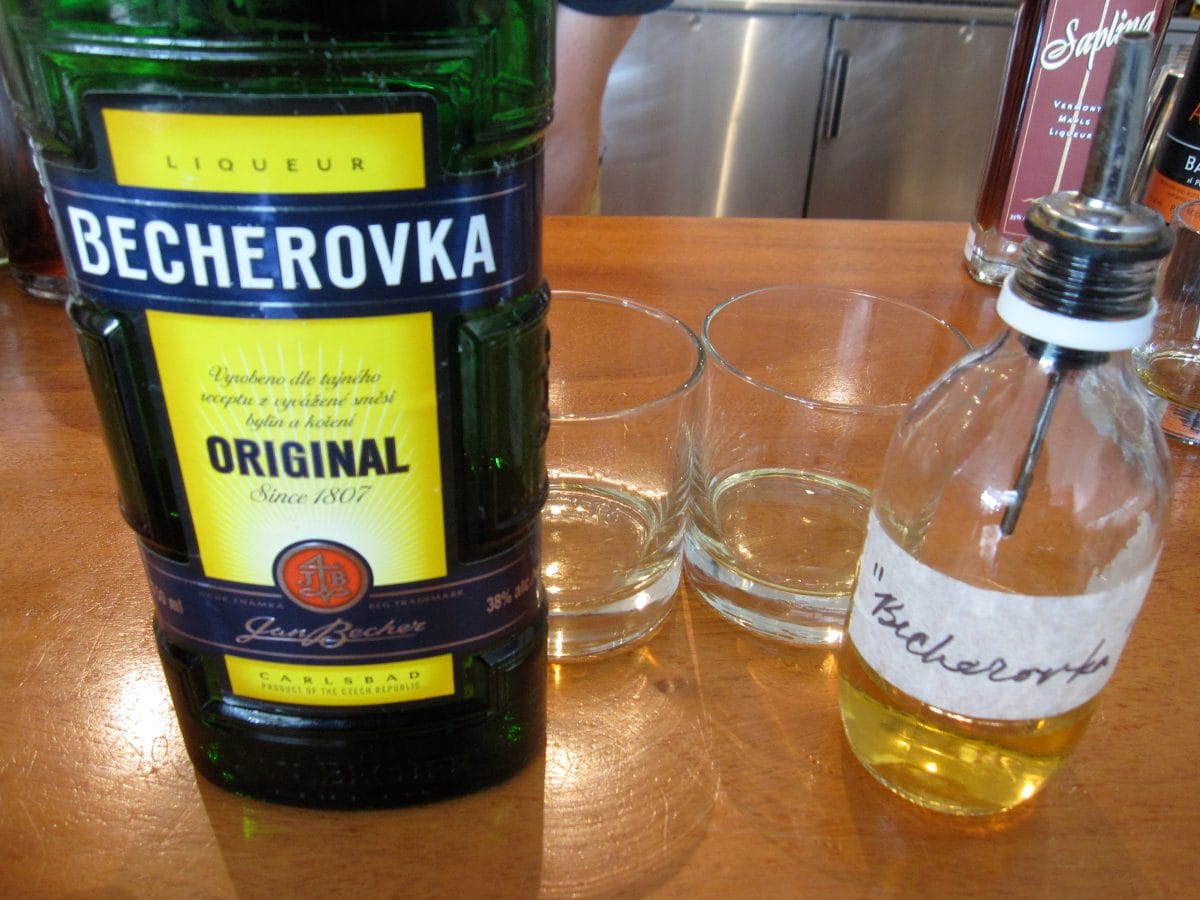
What’s the most recent drink that you developed?
I’ve been playing with this stuff, this Amaro. Bassano is really strange. For years, I’ve always seen this but could never figure out how to put into a drink. It’s too sweet, but then it’s very minty too.
It’s almost medicinal.
Yeah. These are things that might not work in every drink.
What have you been doing with the Bassano?
This one I’ve been doing with Rittenhouse rye and a maple liqueur. Sapling. They work well together, these two.
[Pike pulls out a bottle of “Becherovka”]
The newest thing that I’ve really been doing is learning to make this kind of stuff. It’s the ability to make these things that are already here. You see bartenders making Fernets. I don’t really want to do that, but this is me trying to recreate this. I’ve gotten pretty close.
This is your version and this is the original?
Yeah. The thing is that this is not imported anymore.
Oh. So you can’t even get it?
No, I got a whole bunch of bottles at the liquor store.
Is that why you created Angostura? Because it was hard to come by?
Yes. That was not fun.
What’s a cocktail that you think is past its prime, that you wouldn’t want to see on your menu or any other?
Nothing comes to mind…The main thing that really ruins cocktails is not making them right. Not measuring, and not shaking right. Not double straining. You don’t see that very often here.
What’s a very simple cocktail for people to make at home, and what would the recipe be?
For parties, the one that I normally do is a French 75: gin, simple, lemon and bubbly on top.
How much of each ingredient?
I do an ounce of gin, half-ounce of two-to-one simple syrup, a half-ounce of lemon in each drink and fill it up with champagne.
What sort of gin would you use in a French 75?
London Dry works best. Something lighter. Maybe Sapphire.
If you could only drink one more cocktail, what would it be? This is a last glass situation.
Probably a Manhattan.
How come?
It’s just always a drink I think of, or a Negroni, if it’s hot.
How would you make a Negroni?
I like Negroni, which is lush vermouth, Campari and Aviation. It’s got a nice pop to it and brings that drink another profile. Equal parts.
INSIDER TIP: Pike launched his Secret Drink Menu at The Tasting Kitchen in January 2010. He grants access based on curiosity or insider knowledge. The menu changes every 3-4 weeks, but currently features options like the Smokehouse, with mezcal, chinato and cynar.

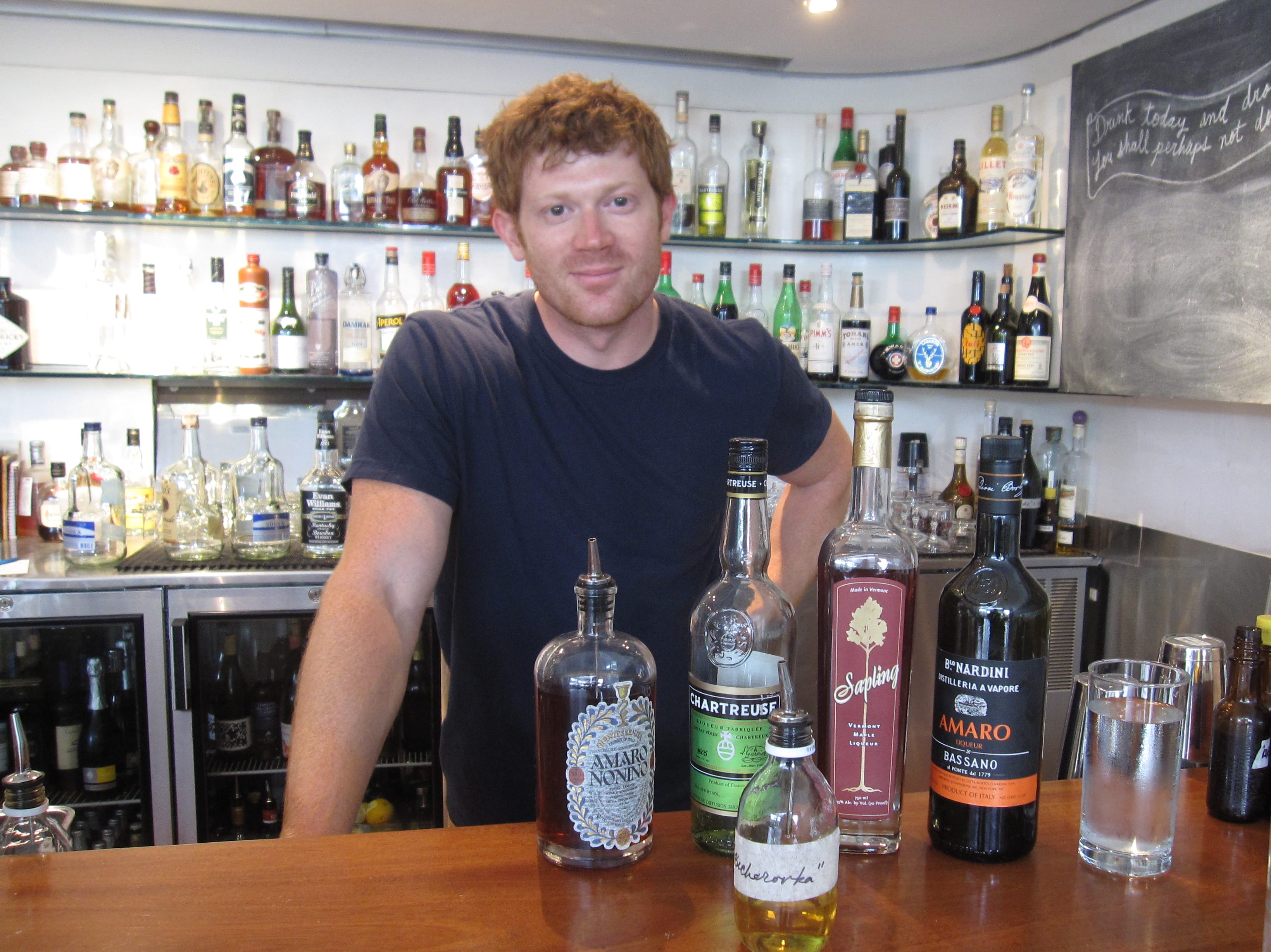
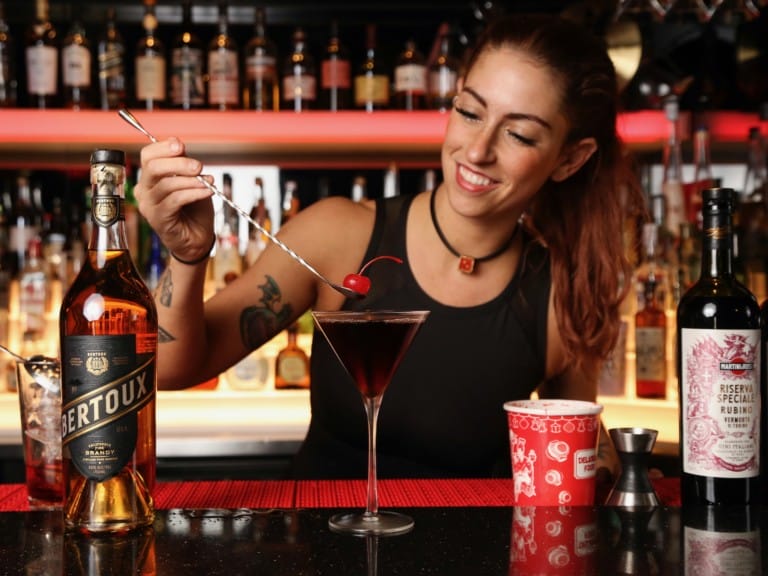
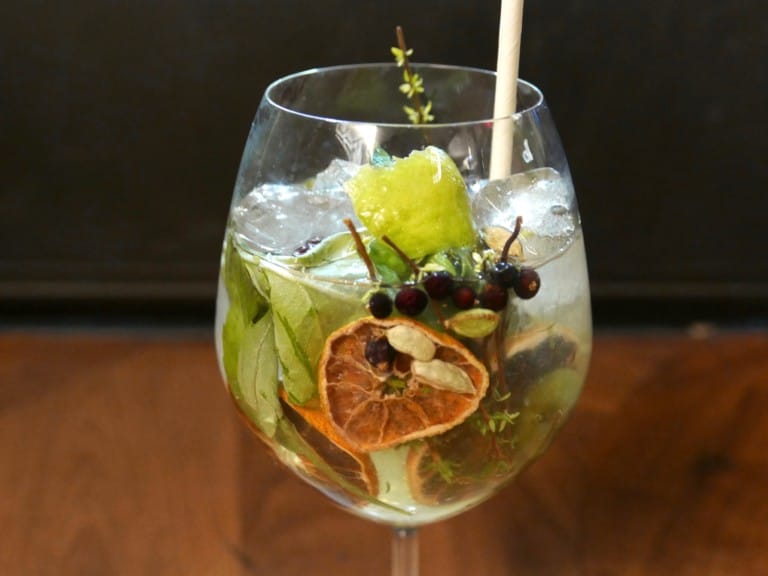
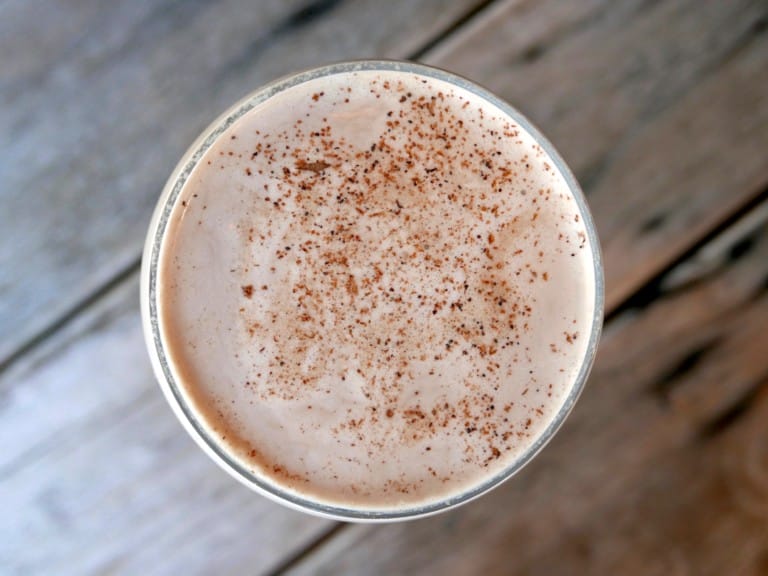




Blog Comments
Chris Mullins
October 10, 2011 at 3:55 AM
I am going to try making the French 75 you recommended. What an interesting approach you take to mixing. I’m really impressed.
Organic Jungle Blog
September 16, 2010 at 6:21 AM
Quassia Bark Powder…
[…] ich is almond, with clove and cinnamon. This one’s sort of playing with that i […]…
Maria O
June 19, 2010 at 12:32 PM
Your interview was so interesting. Once an artist, always an artist! I will have to try one of your medicinal drinks one of these days.
In the City: Restaurant Daniel, New York City
June 16, 2010 at 9:28 AM
[…] Food GPS » Q&A with mixologist Justin Pike (The Tasting Kitchen) […]
Susan
June 12, 2010 at 3:51 PM
Amazing interview!